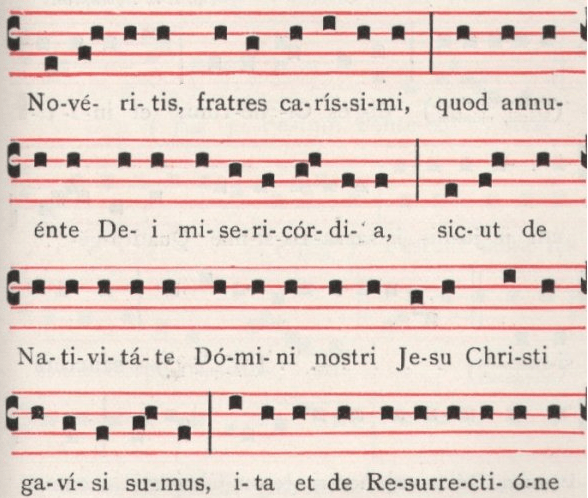
The Noveritis, also known as the Epiphany Proclamation, is a listing of liturgical dates of moveable feasts in the year ahead. Noveritis is the first word of a refrain when the text is sung.
According to ancient custom, the date of Easter was announced on the feast of Epiphany. This tradition dated from a time when calendars were not readily available, and the church needed to publicize the date of Easter, since many celebrations of the liturgical year depend on it. (Wikipedia)
The proclamation may be read or sung, either after the reading of the Gospel or after the postcommunion prayer.
Dear brothers and sisters,
the glory of the Lord is dawning upon us,
and will always shine on us
until the day of his return.
We will celebrate the mysteries of our salvation
in the course of the coming year:
Ash Wednesday will be on the _____ of _____, the beginning of the season of Lent.
We will celebrate Resurrection of our Lord on the _____ of _____, with Easter joy.
The Ascension of our Lord will be on the _____ of _____.
The Day of Pentecost will be on the _____ of _____.
The First Sunday of Advent will be on the _____ of _____.
To Jesus Christ, who is, who was, and who is coming,
the Lord of all time and history,
be endless praise, forever and ever.
Amen.
Source: Adapted from http://www.standrewsemporia.org/epiphany.html.https://www.english.op.org/wp-content/uploads/2022/12/noveritis-2023-with-translation.pdf
See also: https://chasingchurches.com/2019/01/11/epiphany-proclamation-easter/
For 2024
Dear brothers and sisters,
the glory of the Lord is dawning upon us,
and will always shine on us
until the day of his return.
We will celebrate the mysteries of our salvation
in the course of the coming year:
Ash Wednesday will be on the 14th of February,
the beginning of the season of Lent.
We will celebrate Resurrection of our Lord on the 31st of March,
with Easter joy.
The Ascension of our Lord will be on the 9th of May.
The Day of Pentecost will be on the 19th of May.
The First Sunday of Advent will be on the 1st of December.
To Jesus Christ, who is, who was, and who is coming,
the Lord of all time and history,
be endless praise, forever and ever.
Amen.
For 2025
Dear brothers and sisters,
the glory of the Lord is dawning upon us,
and will always shine on us
until the day of his return.
We will celebrate the mysteries of our salvation
in the course of the coming year:
Ash Wednesday will be on the 5th of March,
the beginning of the season of Lent.
We will celebrate Resurrection of our Lord on the 20th of April,
with Easter joy.
The Ascension of our Lord will be on the 29th of May.
The Day of Pentecost will be on the 8th of June.
The First Sunday of Advent will be on the 30th of November.
To Jesus Christ, who is, who was, and who is coming,
the Lord of all time and history,
be endless praise, forever and ever.
Amen.
For 2026
Dear brothers and sisters,
the glory of the Lord is dawning upon us,
and will always shine on us
until the day of his return.
We will celebrate the mysteries of our salvation
in the course of the coming year:
Ash Wednesday will be on the 18th of February,
the beginning of the season of Lent.
We will celebrate Resurrection of our Lord on the 5th of April,
with Easter joy.
The Ascension of our Lord will be on the 14th of May.
The Day of Pentecost will be on the 24th of May.
The First Sunday of Advent will be on the 29th of November.
To Jesus Christ, who is, who was, and who is coming,
the Lord of all time and history,
be endless praise, forever and ever.
Amen.
A shorter form, based on the Latin text:
Dear brothers and sisters,
as we have rejoiced in the birth of our Lord Jesus Christ,
so by God’s mercy we announce to you
the joy of our Savior’s resurrection.
Ash Wednesday, the beginning of Lent, will occur on the _____ of _____.
The Resurrection of our Lord will occur on the _____ of _____.
The Ascension of the Lord will be commemorated on the _____ of _____.
Pentecost, the conclusion of the season of Easter, will be celebrated on the _____ of _____.
Thus the First Sunday of the Advent of our Lord Jesus Christ will be the _____ of _____.
To him honor and glory, forever and ever.
Amen.
Latin text from http://www.liturgialatina.org/pontificale/084.htm



